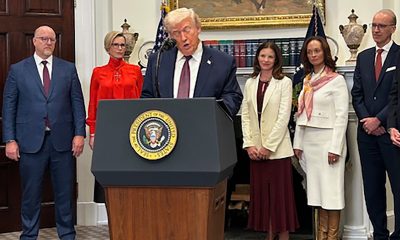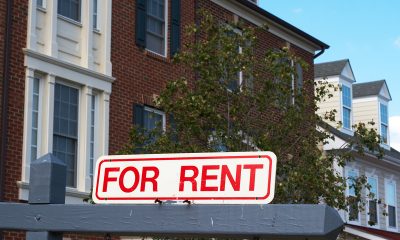Africa
Ugandan activists travel to D.C.
MPs last month passed Anti-Homosexuality Act
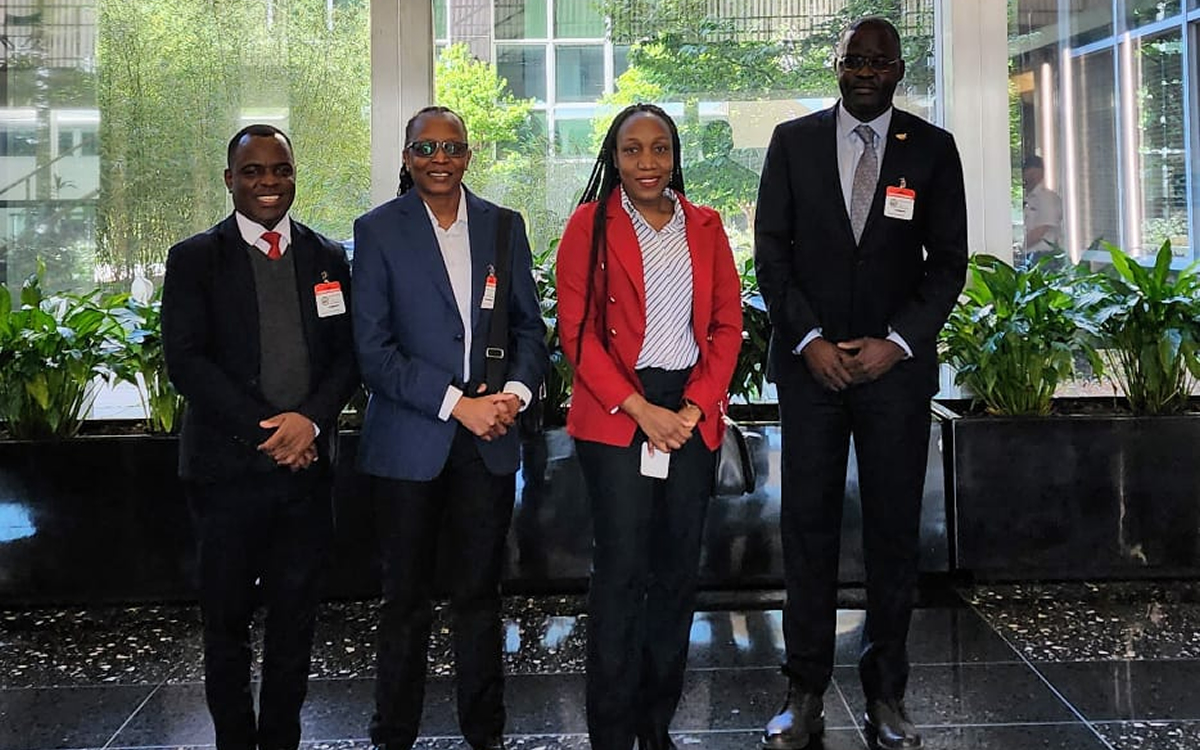
A group of LGBTQ and intersex activists from Uganda traveled to D.C. this week.
Sexual Minorities Uganda Executive Director Frank Mugisha, GLBTQ Legal Advocates and Defenders Senior Manager of Organizational Culture and Community Partnerships Quin Mbabazi and Chapter Four Uganda Executive Director Nicholas Opiyo on Monday spoke about the country’s Anti-Homosexuality Act 2023 at the Center for Strategic and International Studies in D.C. Maria Burnett, senior associate of CSIS’ Africa Program, moderated the panel discussion in which Jessica Stern, the special U.S. envoy for the promotion of LGBTQ and intersex rights rights, also participated.
Mugisha, Mbabazi, Opiyo and Jacqueline Kasha Nabagesara while in D.C. met officials from the White House, the State Department and the U.S. Agency for International Development and representatives from the Council for Global Equality. The activists also briefed the Congressional Equality Caucus.
D.C pic.twitter.com/aOgGeGpImq
— Dr. Frank Mugisha (@frankmugisha) April 11, 2023
Assistant Health Secretary Rachel Levine, a four-star admiral in the U.S. Public Health Service who is the first openly transgender person confirmed by the U.S. Senate, on Thursday tweeted a picture of her with Mugisha.
“It was such an honor to meet (Frank Mugisha.) His courage gives me strength, but no one should have to be brave just to be their authentic self,” tweeted Levine. “Progress is not real unless it means progress for all.”
It was such an honor to meet @frankmugisha. His courage gives me strength, but no one should have to be brave just to be their authentic self. Progress is not real unless it means progress for all. #GlobalHealth #HealthEquity @HHS_Global pic.twitter.com/ughU80xjY7
— ADM Rachel Levine (@HHS_ASH) April 13, 2023
The activists came to D.C. less than a month after Ugandan MPs passed the Anti-Homosexuality Act.
Opiyo notes the measure would impose a “mandatory” death penalty for “aggravated homosexuality” and “anybody who is convicted of being engaged in same-sex relations” would face life in prison.
The bill would also punish the “promotion, recruitment and funding” of LGBTQ-specific activities in Uganda with up to 10 years in prison. Any “person who ‘holds out as a lesbian, gay, transgender, a queer or any other sexual or gender identity that is contrary to the binary categories of male and female'” would also face up to 10 years in prison. Opiyo also noted the measure’s provision that would require Ugandans to report LGBTQ-specific activities to authorities would create “a moral police force.”
Uganda is among the dozens of countries in which consensual same-sex sexual relations are criminalized.
President Yoweri Museveni in 2014 signed that year’s Anti-Homosexuality Act, which imposed a life sentence upon anyone found guilty of repeated same-sex sexual acts. The law was known as the “Kill the Gays” bill because it previously contained a death penalty provision.
The U.S. subsequently cut aid to Uganda and imposed a travel ban against officials who carried out human rights abuses. Uganda’s Constitutional Court later struck down the 2014 Anti-Homosexuality Act on a technicality.
Museveni has said he supports the current bill for which MPs with close ties to anti-LGBTQ American evangelical groups have championed.
“Anti-gay groups and anti-gender groups (are) radicalizing the Ugandan society against the LGBTQ community,” said Mugisha during the CSIS panel. “We’re seeing a lot of hatred. We’re seeing a lot of fear of LGBTQ persons.”
Mugisha noted there has been an increase in violence against LGBTQ and intersex Ugandans over the last year. Uganda’s National Bureau for Non-Government Organizations last August forced Sexual Minorities Uganda to shut down.
“We’re seeing a very systematic, targeted, group that is targeting the LGBTQ community and we’ve seen that Ugandans have sort of been prepared for this legislation,” said Mugisha.
US ‘has significant concerns about the Anti-Homosexuality Act’
Stern during the CSIS panel reiterated the Biden-Harris administration’s criticisms of the Anti-Homosexuality Act.
“The U.S. has significant concerns about the Anti-Homosexuality Act that the Parliament of Uganda passed on March 21,” said Stern. “If the Anti-Homosexuality Act is signed into law and enacted, it would threaten the human rights of Ugandan citizens, jeopardize progress in the fight against HIV/AIDS, deter tourism and investment in Uganda and damage Uganda’s international reputation.”
White House Press Secretary Karine Jean-Pierre during her March 22 press briefing reiterated many of the same points that Stern did. National Security Council spokesperson John Kirby that day also noted the U.S. provides substantial aid to Uganda through the U.S. President’s Emergency Plan for AIDS Relief and other programs.
“If this bill passes as it is now, the work that PEPFAR currently funds would be criminalized,” said Burnett. “We’re talking about people who are implementing U.S.-funded programs who could not do their jobs without potentially running afoul of the law and losing their liberty.”
Stern said the U.S. “continues to raise issues around the Anti-Homosexuality Act with the government of Uganda at all levels” and is “coordinating with diplomatic partners, with the private sector and with human rights organizations directly.” Stern also noted she and her colleagues are in “daily communication” with Mugisha and the other activists who were on the CSIS panel.
“We’re in constant contact with the community because they know how severe this issue is, how high the stakes are, how to push, what messages to use and what consequences the threat of the bill is already having on the community,” said Stern. “LGBTQI human rights defenders and human rights defenders of all stripes in Uganda are some of our greatest partners in this work. We are working with partners to engage at the multilateral level to address this issue.”
Stern also warned the U.S. would reconsider foreign assistance to Uganda if Museveni signs the Anti-Homosexuality Act.
“We are investing the potential impact of the Anti-Homosexuality Act on U.S. foreign assistance,” said Stern. “If this bill is signed into law, it will be an action-forcing event.”
Egypt
Iran, Egypt object to playing in Seattle World Cup ‘Pride Match’
Game to take place on June 26

Iran and Egypt have objected to playing in a “Pride Match” that will take place in Seattle during the 2026 World Cup.
The Egyptian Football Association on Tuesday said it told FIFA Secretary General Mattias Grafström in a letter that “it categorically rejects holding any activities related to supporting (homosexuality) during the match between the Egyptian national team and Iran, scheduled to be held in Seattle, USA, on June 26, 2026, in the third round of the group stage of the 2026 World Cup.” Football Federation Islamic Republic of Iran President Mehdi Taj told ISNA, a semi-official Iranian news agency that both his country and Egypt “protested this issue.”
The 2026 World Cup will take place in the U.S., Canada, and Mexico. The draw took place at the Kennedy Center on Dec. 5.
Iran is among the handful of countries in which consensual same-sex sexual relations remain punishable by death.
The State Department’s 2023 human rights report notes that while Egyptian law “did not explicitly criminalize consensual same-sex sexual activity, authorities regularly arrested and prosecuted LGBTQI+ persons on charges including ‘debauchery,’ prostitution, and ‘violating family values.’” Egyptian authorities “also reportedly prosecuted LGBTQI+ individuals for ‘misuse of social media.’”
“This resulted in de facto criminalization of same-sex conduct and identity,” notes the report.
The 2024 human rights report the State Department released earlier this year did not include LGBTQ-specific references.
Soccer has ‘unique power to unite people across borders, cultures, and beliefs’
The June 26 match between Iran and Egypt coincides with Seattle Pride. The Washington Post reported the Seattle FIFA World Cup 2026 Local Organizing Committee decided to hold the “Pride Match” before last week’s draw.
“As the Local Organizing Committee, SeattleFWC26’s role is to prepare our city to host the matches and manage the city experience outside of Seattle Stadium,” said SeattleFWC26 Vice President of Communications Hana Tadesse in a statement the committee sent to the Washington Blade on Wednesday. “SeattleFWC26 is moving forward as planned with our community programming outside the stadium during Pride weekend and throughout the tournament, partnering with LGBTQ+ leaders, artists, and business owners to elevate existing Pride celebrations across Washington.”
“Football has a unique power to unite people across borders, cultures, and beliefs,” added Tadeese. “The Pacific Northwest is home to one of the nation’s largest Iranian-American communities, a thriving Egyptian diaspora, and rich communities representing all nations we’re hosting in Seattle. We’re committed to ensuring all residents and visitors experience the warmth, respect, and dignity that defines our region.”
The 2034 World Cup will take place in Saudi Arabia.
Consensual same-sex sexual relations remain punishable by death in the country. The 2022 World Cup took place in neighboring Qatar, despite concerns over the country’s anti-LGBTQ rights record.
Eswatini
PEPFAR delivers first doses of groundbreaking HIV prevention drug to two African countries
Lenacapavir now available in Eswatini and Zambia.
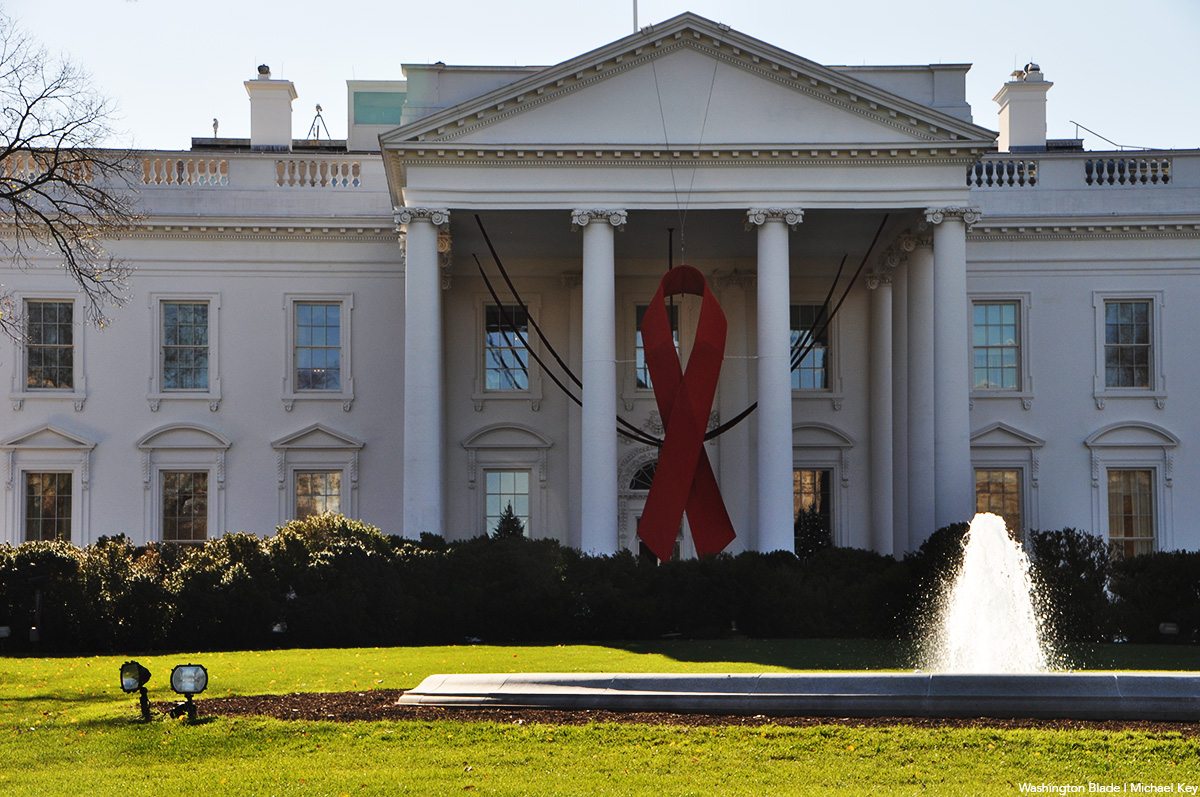
The State Department on Tuesday announced PEPFAR has delivered the first doses of a groundbreaking HIV prevention drug to two African countries.
The lenacapavir doses arrived in Eswatini and Zambia.
The State Department in September unveiled an initiative with Gilead Sciences to bring lenacapavir “to market in high-burden HIV countries.”
Lenacapavir users inject the drug twice a year.
The State Department in its September announcement noted everyone who participated in Gilead’s clinical trials remained HIV negative. It also said lenacapavir “has the potential to be particularly helpful for pregnant and breastfeeding mothers, as it safely protects them during and after pregnancy to prevent mother-to-child transmission.”
“In our new America First Global Health Strategy, the Department of State is establishing a first-of-its-kind innovation fund to support American-led research, market-shaping, and other dynamic advancements in global health,” said PEPFAR on Tuesday in a press release.
“The arrivals of the first doses of lenacapavir in Eswatini and Zambia mark an important milestone in HIV prevention and reflect our commitment to supporting communities with the greatest need,” added Gilead CEO Daniel O’Day. “For the first time, a new HIV medicine is reaching communities in sub-Saharan Africa in the same year as its U.S. approval.”
The September announcement came against the backdrop of widespread criticism over the Trump-Vance administration’s reported plans to not fully fund PEPFAR and to cut domestic HIV/AIDS funding. The Washington Blade has previously reported PEPFAR-funded programs in Kenya and other African countries have been forced to curtail services or even close because of U.S. funding cuts.
Botswana
The first courageous annual Palapye Pride in Botswana
Celebration was a beginning rooted in courage, community, and love.
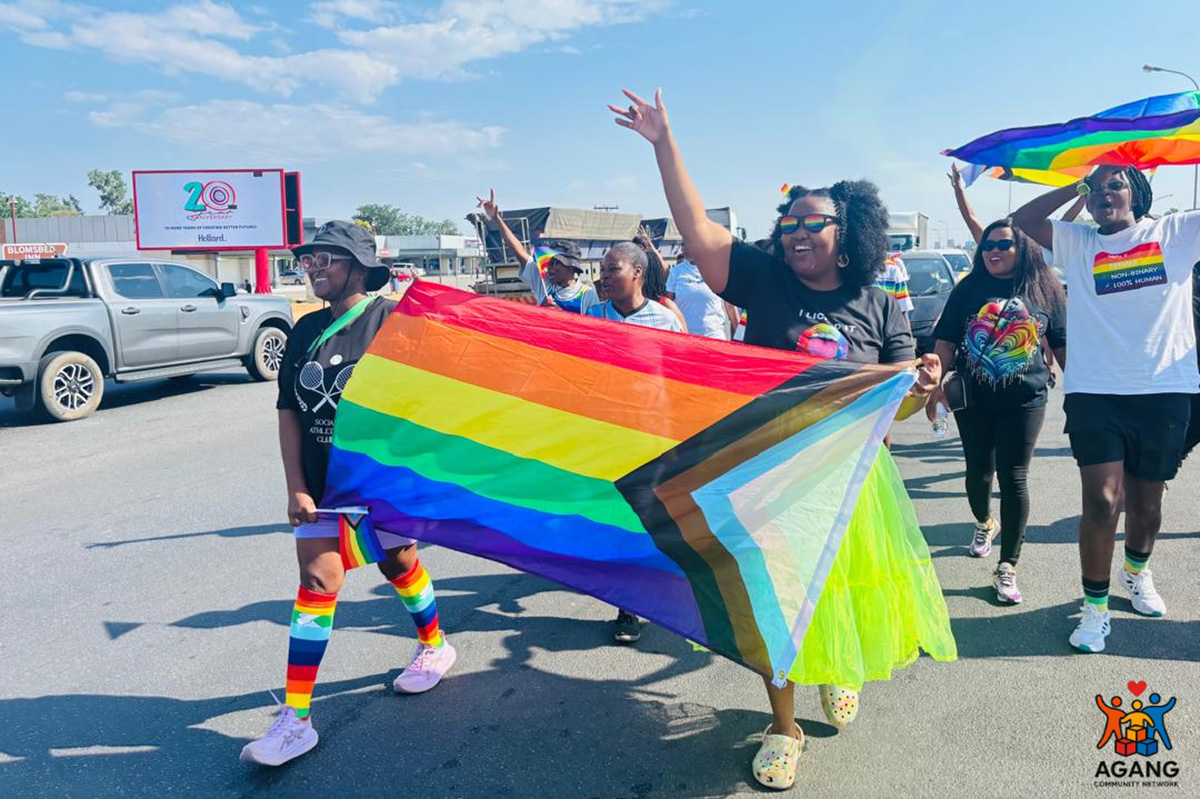
“When the sun rose on 1 Nov., 2025, Pride morning in Palapye, the open space where the march was scheduled to begin was empty. I stood there trying to look calm, but inside, my chest felt tight. I was worried that no one would come. It was the first-ever Pride in Palapye, a semi-urban village where cultural norms, religious beliefs, and tradition are deeply woven into everyday life.
I kept asking myself if we were being naive. Maybe people weren’t ready. Perhaps fear was going to win. For the first 30 minutes, it was me, a couple of religious leaders and a handful of parents. That was it. The silence was loud, and every second felt like it stretched into hours. I expected to see the queer community showing up in numbers, draped in color and excitement. Instead, only the wind was moving.
But slowly, gently, just like courage often arrives, people started to show up with a rainbow flag appearing from behind a tree and a hesitant wave from someone standing at a distance.
That’s when I understood that people weren’t late, just that they were afraid. And their fear made sense. Showing up openly in a small community like Palapye is a radical act. It disrupts silence. It challenges norms. It forces visibility. Visibility is powerful, but it is never easy. We marched with courage, pulling from the deepest parts of ourselves. We marched with laughter that cracked through the tension. We marched not because it was easy, but because it was necessary,” narrates activist Seipone Boitshwarelo from AGANG Community Network, which focuses on families and friends of LGBTIQ+ people in Botswana. She is also a BW PRIDE Awards nominee for the Healing and Justice Award, a category which acknowledges contributions to wellness, mental health, and healing for the LGBTIQ+ community across Botswana.
Queer Pride is Botswana Pride!
Pride is both a celebration and a political statement. It came about as a response to systemic oppression, particularly the criminalization and marginalization of LGBTIQ+ people globally, including in Botswana at some point. It is part of the recognition, equality, and assertion of human rights. It also reminds us that liberation and equality are not automatically universal, and continued activism is necessary. A reminder of the famous saying by Fannie Lou Hamer, “Nobody is free until everybody’s free.”
The 2023 Constitutional Review process made one thing evident, which is that Botswana still struggles to acknowledge the existence of LGBTIQ+ people as full citizens. Instead of creating a democratic space for every voice, the process sidelined and erased an entire community. In Bradley Fortuin’s analysis of the Constitutional review and its final report, he highlighted how this erasure directly contradicts past court decisions that explicitly affirmed the right of LGBTIQ+ people to participate fully and openly in civic life. When the state chooses to ignore court orders and ignore communities, it becomes clear that visibility must be reclaimed through alternative means. This is why AGANG Community Network embarked on Palapye Pride. It is a radical insistence on belonging, rooted in community and strengthened through intersectionality with families, friends, and allies who refuse to let our stories be erased.
Motho ke motho ka batho!
One of the most strategic decisions made by the AGANG Community Network was to engage parents, religious leaders, and local community members, recognizing their value in inclusion and support. Thus, their presence in the march was not symbolic, but it was intentional.
Funding for human rights and LGBTIQ+ advocacy has been negatively impacted since January 2025, and current funding is highly competitive, uneven and scarce, especially for grassroots organizations in Botswana. The Palapye Pride event was not funded, but community members still showed up and donated water, a sound system, and someone even printed materials. This event happened because individuals believed in its value and essence. It was a reminder that activism is not always measured in budgets but in willingness and that “motho ke motho ka batho!” (“A person is a person because of other people!”).
Freedom of association for all
In March 2016, in the the Attorney General of Botswana v. Rammoge and 19 Others case, also known as the LEGABIBO registration case, the Botswana Court of Appeal stated that “members of the gay, lesbian, and transgender community, although no doubt a small minority, and unacceptable to some on religious or other grounds, form part of the rich diversity of any nation and are fully entitled in Botswana, as in any other progressive state, to the constitutional protection of their dignity.” Freedom of association, assembly, and expression is a foundation for civic and democratic participation, as it allows all citizens to organize around shared interests, raise their collective voice, and influence societal and cultural change, as well as legislative reform.
The Botswana courts, shortly after in 2021, declared that criminalizing same-sex sexual relations is unconstitutional because they violated rights to privacy, liberty, dignity, equality, and nondiscrimination. Despite these legal wins, social stigma, cultural, and religious opposition continue to affect the daily lived experience of LGBTIQ+ people in Botswana.
The continuation of a declaration
AGANG Community Network is committed to continuing this work and creating safe and supportive spaces for LGBTIQ+ people, their families, friend, and allies. Pride is not just a day of fun. It is a movement, a declaration of queer existence and recognition of allyship. It is healing and reconciliation while amplifying queer joy.
Seipone Boitshwarelo is a feminist, activist, social justice healer, and founder of AGANG Community Network. Bradley Fortuin is a social justice activist and a consultant at the Southern Africa Litigation Center.

